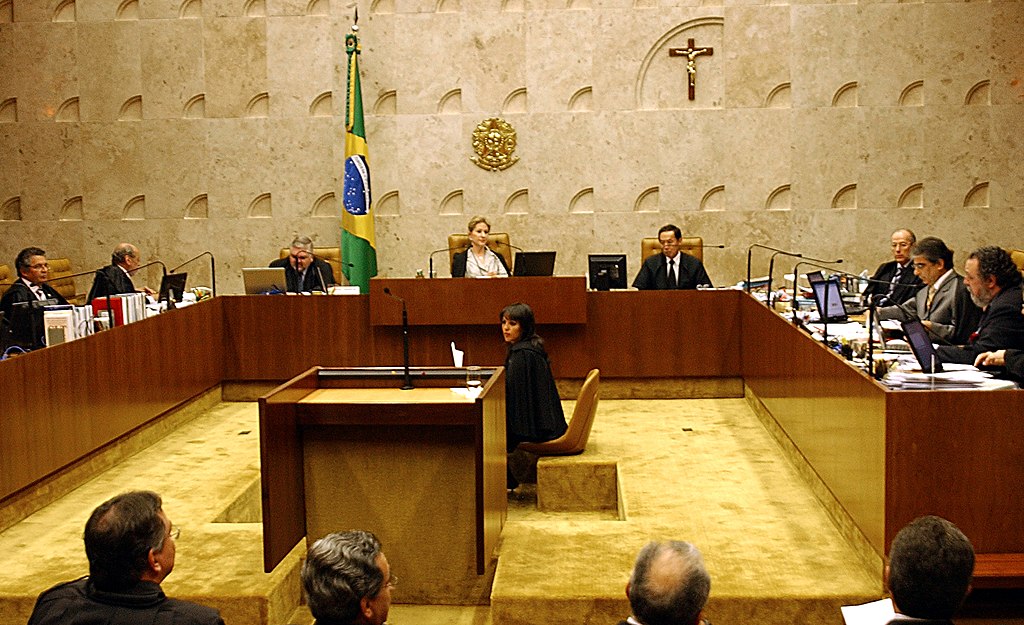The Supreme Court in Brazil has decriminalized possession of cannabis for personal use, a decision expected to reduce prison overcrowding by reducing small-scale drug-related incarcerations. Despite this ruling, legislative challenges persist as Congress considers stricter drug laws, potentially overriding the Court’s decision, amidst ongoing debates about the best approach to drug policy reform.
Brazil Decriminalizes Cannabis Possession – Supreme Court Decision


The Supreme Court in Brazil has taken a significant step in decriminalizing the possession of cannabis for personal use, aligning the country with several other Latin American nations.
This historic decision, concluded by final votes on Tuesday, represents a crucial shift in Brazil’s drug policy and has been years in the making. Deliberations began in 2015, and with the majority of the 11 members of the Court voting in favor of decriminalization, this move is expected to help reduce the country’s enormous prison population.
For more news like this, along with all the latest in legalization, research, and lifestyle, download our free cannabis news app.
Supreme Court Decision in Brazil
Supreme Court judges agreed that decriminalization should apply only to possession of quantities suitable for personal use. The sale of cannabis will remain illegal. However, the exact quantity that will be considered personal use has yet to be determined. This clarification is expected to be finalized shortly.
In 2006, the Brazilian Congress passed a law aimed at combating small-scale drug possession by providing for substitute penalties such as community service. However, the law’s vague nature failed to define specific quantities, leaving law enforcement and judicial services to interpret the boundary between personal use and drug trafficking. This ambiguity led to numerous arrests for small amounts of drugs under trafficking charges, worsening Brazil’s already critical prison overcrowding.
The Supreme Court’s decision is expected to ease the burden on Brazil’s penitentiary system. Ilona Szabo, president of the Igarape Institute, emphasized that a significant portion of those detained or convicted for drug trafficking are first-time offenders carrying small amounts of illicit substances. They are often unarmed and have no links to organized crime.
Legislative Challenges
Despite the Supreme Court’s ruling, the legislative landscape remains complex. Congress is simultaneously advancing proposals that could strengthen the severity of drug laws. In April, the Senate approved a constitutional amendment aiming to criminalize the possession of any quantity of illicit substances. This proposal has passed through the constitutional committee of the lower house and still needs to be approved before being voted on. If adopted, this legislation would override the Supreme Court’s ruling, although it could face constitutional challenges.
Senate President Rodrigo Pacheco stated that the issue should be resolved through legislative means rather than judicial decisions, reflecting the current tensions between Brazil’s judicial and legislative branches over drug policy reform.
Activism and Public Opinion Reaction
For many activists and legal experts in Brazil, the Supreme Court’s decision is a long-awaited victory in a country with one of the largest prison populations in the world. Critics of the current legislation argue that consumers caught with small amounts of drugs are often convicted of trafficking and end up in overcrowded prisons, where they may be forced to affiliate with prison gangs. Cristiano Maronna, director of the civil society group JUSTA, noted that drug trafficking is the main factor for imprisonment in Brazil.
The decriminalization movement also highlights racial disparities in the criminal justice system in Brazil. According to a study by the Insper Institute, Black individuals found in possession of drugs are slightly more likely to be charged as traffickers than their white counterparts.
Brazilian Region Context
The decision to decriminalize cannabis in Brazil follows trends observed in other Latin American countries. Uruguay fully legalized recreational cannabis use in 2013, and Colombia decriminalized possession ten years ago. However, recreational sales remain illegal in Colombia despite ongoing legislative efforts.
In Argentina, the Supreme Court ruled in 2009 that penalizing adults for personal cannabis use was unconstitutional, although the law itself has not been changed. Similarly, medical cannabis use is permitted in Brazil and other countries like Argentina and Mexico, though it is often subject to strict regulations.
—
(Featured image by Brazil Agency (CC BY 3.0 BR) via Wikimedia Commons)
DISCLAIMER: This article was written by a third-party contributor and does not reflect the opinion of Hemp.im, its management, staff, or its associates. Please review our disclaimer for more information.
This article may include forward-looking statements. These forward-looking statements generally are identified by the words “believe,” “project,” “estimate,” “become,” “plan,” “will,” and similar expressions. These forward-looking statements involve known and unknown risks as well as uncertainties, including those discussed in the following cautionary statements and elsewhere in this article and on this site. Although the company may believe that its expectations are based on reasonable assumptions, the actual results that the company may achieve may differ materially from any forward-looking statements, which reflect the opinions of the management of the company only as of the date hereof. Additionally, please make sure to read these important disclosures.
First published in Newsweed, a third-party contributor translated and adapted the article from the original. In case of discrepancy, the original will prevail.
Although we made reasonable efforts to provide accurate translations, some parts may be incorrect. Hemp.im assumes no responsibility for errors, omissions or ambiguities in the translations provided on this website. Any person or entity relying on translated content does so at their own risk. Hemp.im is not responsible for losses caused by such reliance on the accuracy or reliability of translated information. If you wish to report an error or inaccuracy in the translation, we encourage you to contact us.



Comments are closed for this post.